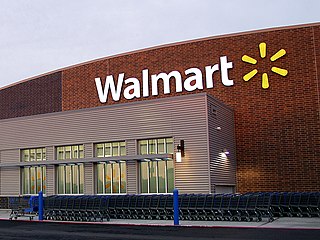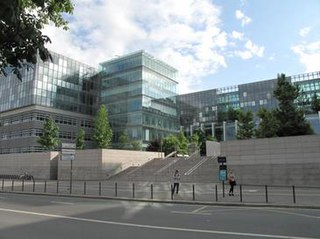
A convenience store, convenience shop, bodega, corner store, corner shop, or superette is a small retail store that stocks a range of everyday items such as tea, coffee, groceries, fruits, vegetables, snacks, confectionery, soft drinks, ice creams, tobacco products, lottery tickets, over-the-counter drugs, toiletries, newspapers and magazines.

A supermarket is a self-service shop offering a wide variety of food, beverages and household products, organized into sections. This kind of store is larger and has a wider selection than earlier grocery stores, but is smaller and more limited in the range of merchandise than a hypermarket or big-box market. In everyday United States usage, however, "grocery store" is often used to mean "supermarket".

Shopping is an activity in which a customer browses the available goods or services presented by one or more retailers with the potential intent to purchase a suitable selection of them. A typology of shopper types has been developed by scholars which identifies one group of shoppers as recreational shoppers, that is, those who enjoy shopping and view it as a leisure activity.

A grocery store (AE), grocery shop (BE) or simply grocery is a retail store that primarily retails a general range of food products, which may be fresh or packaged. In everyday U.S. usage, however, "grocery store" is a synonym for supermarket, and is not used to refer to other types of stores that sell groceries. In the UK, shops that sell food are distinguished as grocers or grocery shops
A loss leader is a pricing strategy where a product is sold at a price below its market cost to stimulate other sales of more profitable goods or services. With this sales promotion/marketing strategy, a "leader" is any popular article, i.e., sold at a low price to attract customers.

A general merchant store is a rural or small-town store that carries a general line of merchandise. It carries a broad selection of merchandise, sometimes in a small space, where people from the town and surrounding rural areas come to purchase all their general goods. The store carries routine stock and obtains special orders from warehouses. It differs from a convenience store or corner shop in that it will be the main shop for the community rather than a convenient supplement.

QuickChek is a chain of convenience stores based in Whitehouse Station, New Jersey with 153 stores in New Jersey and New York. The first store opened in Dunellen, New Jersey in 1967, and has since then grown into a chain. Several stores include pharmacies, gas stations, and liquor departments.
Netto is a Danish discount supermarket brand operating in Denmark, Germany and Poland. Netto is a part Salling Group.

Officeworks is a chain of Australian office supplies stores operated under parent company Wesfarmers.

Brick and mortar is an organization or business with a physical presence in a building or other structure. The term brick-and-mortar business is often used to refer to a company that possesses or leases retail shops, factory production facilities, or warehouses for its operations. More specifically, in the jargon of e-commerce businesses in the 2000s, brick-and-mortar businesses are companies that have a physical presence and offer face-to-face customer experiences.

E.Leclerc is a French retailers' cooperative and hypermarket chain, headquartered in Ivry-sur-Seine. E.Leclerc was established on 1 January 1948 by Édouard Leclerc in Brittany. E.Leclerc currently has more than 720 locations in France and 85 stores outside of the country, as of 2019. The chain enables semi-independent stores to operate under the Leclerc brand.

Les Mousquetaires, known as Os Mosqueteiros in Portugal, is a privately owned retailing symbol group based in France and operating internationally. Its head office is in Bondoufle, France.

Netto is a French discount supermarket chain owned by the Les Mousquetaires group. Previously known as Comptoir des Marchands, the chain changed its name to Netto in 2001. As of 2005 there are over 360 Netto stores in France and Portugal.

Intermarché is a brand of general commercial supermarkets or grocery stores found in France and other European countries. It is part of the large retail group Les Mousquetaires.

A sari-sari store, anglicized as neighborhood sundry store, is a convenience store found in the Philippines. The word sari-sari is Tagalog meaning "variety" or "sundry". Such stores occupy an important economic and social location in a Filipino community and are ubiquitous in neighborhoods and along streets. Sari-sari stores tend to be family-run and privately owned operating within the shopkeeper's residence.

Tegut is a German-owned supermarket chain based in Fulda, Germany, which operates more than 300 supermarkets with approximately 7,600 employees across six of Germany's Bundesländer, namely in Hesse, Thuringia, Bavaria, Rhineland-Palatinate, Saxony-Anhalt, Lower Saxony and Baden-Württemberg. In early January 2013 it was bought by the Swiss retail company Migros.

Bricomarché offer decorating, DIY, materials, gardening and pet products lines. Founded in 1979, and operating 500 stores in 3 countries, each store's sales area is between 1,500 and 2,300 m2, and have three basic principles:

Vêti is a French clothing shop, offering clothes for the family with over 150 retail outlets in France. Vêti has its own brands, nine in all, as well as national brands such as Levi's, Lee Cooper and Ober at low prices.
Reliance Digital is an Indian consumer electronics retailer. It is a subsidiary of Reliance Retail, a wholly owned subsidiary of Reliance Industries.
The retail format influences the consumer's store choice and addresses the consumer's expectations. At its most basic level, a retail format is a simple marketplace, that is; a location where goods and services are exchanged. In some parts of the world, the retail sector is still dominated by small family-run stores, but large retail chains are increasingly dominating the sector, because they can exert considerable buying power and pass on the savings in the form of lower prices. Many of these large retail chains also produce their own private labels which compete alongside manufacturer brands. Considerable consolidation of retail stores has changed the retail landscape, transferring power away from wholesalers and into the hands of the large retail chains.
















